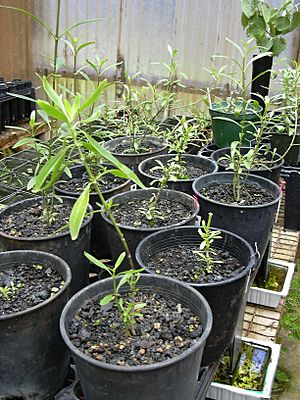Kadua coriacea facts for kids
Quick facts for kids Kadua coriacea |
|
|---|---|
 |
|
| Kadua coriacea | |
| Conservation status | |
| Scientific classification | |
| Kingdom: | |
| (unranked): | |
| (unranked): | |
| (unranked): | |
| Order: | |
| Family: | |
| Genus: |
Kadua
|
| Species: |
K. coriacea
|
| Binomial name | |
| Kadua coriacea Sm.
|
|
| Synonyms | |
|
Hedyotis coriacea |
|
Kadua coriacea is a very rare flowering plant. It is also known by its Hawaiian name, kioʻele. This special plant belongs to the coffee family. It grows only in Hawaii, mainly on the island of Hawaiʻi. There is only one plant left on Maui. Because it is so rare, the United States government lists it as an endangered species. This means it is protected by law.
Contents
Where Kioʻele Lives
Today, most Kadua coriacea plants are found in the Pohakuloa Training Area on Hawaiʻi. There are about 155 wild plants there. Another 75 plants have been carefully planted in this area. On the island of Maui, there is only one known kioʻele plant left. Sadly, this plant was badly burned in a fire in 2007. People are working hard to help it recover by watering and watching it closely.
Kioʻeles Home
This plant likes to grow in woodlands. These forests are mostly filled with ʻōhiʻa lehua trees (Metrosideros polymorpha). Many other native Hawaiian plants also live here. These include aʻaliʻi (Dodonaea viscosa) and koʻokoʻolau (Bidens menziesii). You might also find kawelu (Eragrostis variabilis) and pili grass (Heteropogon contortus). Other plants are kumuniu (Doryopteris decipiens) and nehe (Melanthera lavarum). Also growing nearby are naio (Myoporum sandwicense), ulei (Osteomeles anthyllidifolia), and ʻiliahialoʻe (Santalum ellipticum).
What Kioʻele Looks Like
The kioʻele plant is a shrub. A shrub is like a small, bushy tree. Its leaves are thick and feel like leather. They can grow up to 8 centimeters long and 3 centimeters wide.
Flowers and Fruit
When kioʻele blooms, it produces clusters of flowers. These flowers are shaped like tubes and are a bit fleshy. Each flower can be up to a centimeter long. After the flowers, the plant grows a fruit. This fruit is a small capsule. Inside the capsule, you will find dark brown seeds.
Why Kioʻele is Endangered
There are several reasons why Kadua coriacea is so rare. One big problem is that its home is being damaged. This damage comes from wild animals like goats and pigs. These animals are not native to Hawaii. They eat the plants and stomp on the habitat.
Another threat comes from introduced plant species. These are plants that people brought to Hawaii from other places. They grow very fast and take over the space. This makes it hard for native plants like kioʻele to survive. These problems make it very important to protect this special Hawaiian plant.
 | Selma Burke |
 | Pauline Powell Burns |
 | Frederick J. Brown |
 | Robert Blackburn |


